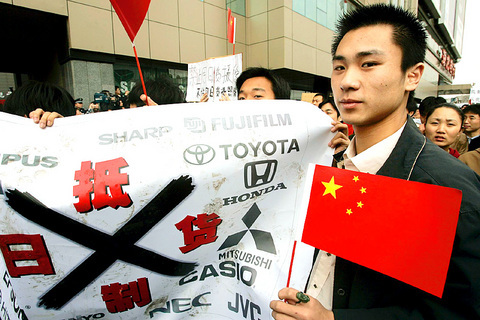China yesterday warned ties with Japan were at a 30-year low and reiterated it would not apologize for widespread protests, but Japan said it saw no need to change its policy despite a "very uncomfortable situation."
As Japanese Foreign Minister Nobutaka Machimura held a second day of talks in Beijing, Chinese Vice Foreign Minister Wu Dawei (
"There are serious difficulties between China and Japan at the moment. It is the most difficult time since the establishment of diplomatic ties in 1972," he told reporters, blaming Japan's refusal to face its past record of aggression.

PHOTO: EPA
In contrast, Japanese foreign ministry spokesman Hatsuhisa Takashima attempted to put a more positive spin on relations as he focused on economics at a press conference in the Chinese capital.
He added, however, that Chinese protesters who damaged Japanese property had created a "very uncomfortable situation."
Ties between East Asia's two most powerful nations have rapidly approached a nadir after Japan approved a nationalist textbook that glossed over wartime atrocities.
They have been further ruffled by Japan's bid for a permanent seat on the UN Security Council.
Meanwhile, three out of every four Japanese voters believe Prime Minister Junichiro Koizumi has not done enough to improve long-strained relations with China and South Korea, according to a newspaper poll published yesterday.
Seventy-six percent of respondents to a poll of about 1,000 voters the Mainichi Shimbun on Saturday and Sunday said Koizumi had not done enough to mend ties with Japan's neighbors, both of which were occupied by Japan before and during World War II.
In Tokyo, shots were fired yesterday at a Chinese language school, hitting a door but causing no injuries, in the latest apparent backlash against violent anti-Japanese demonstrations in China, police and media said.
A razor blade with an anonymous note complaining about the protests also was delivered by mail last week to the Chinese consulate in Fukuoka the Kyodo News agency reported.
Police said they found several bullet holes in the glass door at the entrance of the Japan-China Friendship Center. Investigators also found several bullets at the site. Kyodo said the shooting was believed to be linked to the protests. Nobody claimed responsibility.
Japan's benchmark Nikkei stock index closed down 3.80 percent yesterday amid the escalating tensions, ending at 10,938.44 points -- its lowest point since Dec. 16.

Conflict with Taiwan could leave China with “massive economic disruption, catastrophic military losses, significant social unrest, and devastating sanctions,” a US think tank said in a report released on Monday. The German Marshall Fund released a report titled If China Attacks Taiwan: The Consequences for China of “Minor Conflict” and “Major War” Scenarios. The report details the “massive” economic, military, social and international costs to China in the event of a minor conflict or major war with Taiwan, estimating that the Chinese People’s Liberation Army (PLA) could sustain losses of more than half of its active-duty ground forces, including 100,000 troops. Understanding Chinese

The Ministry of Foreign Affairs (MOFA) yesterday said it is closely monitoring developments in Venezuela, and would continue to cooperate with democratic allies and work together for regional and global security, stability, and prosperity. The remarks came after the US on Saturday launched a series of airstrikes in Venezuela and kidnapped Venezuelan President Nicolas Maduro, who was later flown to New York along with his wife. The pair face US charges related to drug trafficking and alleged cooperation with gangs designated as terrorist organizations. Maduro has denied the allegations. The ministry said that it is closely monitoring the political and economic situation

UNRELENTING: China attempted cyberattacks on Taiwan’s critical infrastructure 2.63 million times per day last year, up from 1.23 million in 2023, the NSB said China’s cyberarmy has long engaged in cyberattacks against Taiwan’s critical infrastructure, employing diverse and evolving tactics, the National Security Bureau (NSB) said yesterday, adding that cyberattacks on critical energy infrastructure last year increased 10-fold compared with the previous year. The NSB yesterday released a report titled Analysis on China’s Cyber Threats to Taiwan’s Critical Infrastructure in 2025, outlining the number of cyberattacks, major tactics and hacker groups. Taiwan’s national intelligence community identified a large number of cybersecurity incidents last year, the bureau said in a statement. China’s cyberarmy last year launched an average of 2.63 million intrusion attempts per day targeting Taiwan’s critical

‘SLICING METHOD’: In the event of a blockade, the China Coast Guard would intercept Taiwanese ships while its navy would seek to deter foreign intervention China’s military drills around Taiwan this week signaled potential strategies to cut the nation off from energy supplies and foreign military assistance, a US think tank report said. The Chinese People’s Liberation Army (PLA) conducted what it called “Justice Mission 2025” exercises from Monday to Tuesday in five maritime zones and airspace around Taiwan, calling them a warning to “Taiwanese independence” forces. In a report released on Wednesday, the Institute for the Study of War said the exercises effectively simulated blocking shipping routes to major port cities, including Kaohsiung, Keelung and Hualien. Taiwan would be highly vulnerable under such a blockade, because it